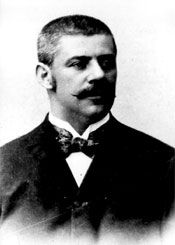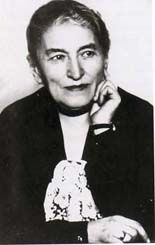Both of Kafka’s parents hailed from the Czech countryside, being latter day participants in the huge migration of rural Jews to the capital in search of greater safety and a more promising existence following the abolition of all kinds of drastic restrictions. The Kafkas, who came from Southern Bohemia, were, apart from the odd exception, a family of outstanding vitality, physical fitness, entrepreneurial spirit and a yen for social advancement. The Löwys, on the other hand, who came from the eastern part of Central Bohemia, were – again apart from the odd exception – people of restraint, discretion, sensitivity and thoughtfulness. All those qualities were to emerge in the course of the years in the lives of members of both of those large families. They included both able businessmen and impractical introverts, scholars and adventurers, globetrotters and eccentric recluses. Franz Kafka felt himself to be more a descendant of his mother’s family, the Löwys. Unlike his father, who strove for family cohesion, Franz was very choosy about whom he associated with in the extended family. He had close ties with certain relatives, particularly on his mother’s side (his uncles Siegfried and Alfred), while others are not mentioned at all in his autobiographical texts.
Father
Hermann Kafka was born at Osek near Písek, son of the kosher butcher Jakob Kafka and Franziska Kafka, née Platowski; he was the fourth of six children, four sons and two daughters: Filip, Anna, Heinrich, Hermann, Julie and Ludwig.

Having started out as a poor peddler in Southern Bohemia, Hermann Kafka rose steadily in society after his arrival in Prague at the beginning of the 1880s. He married Julie, née Löwy, a daughter of a rich family of textile merchants and brewers, and established a haberdashery in the Prague city centre, which he progressively expanded into a department store in the Kinsky Palace on the Old Town Square. Towards the end of his life he also purchased an apartment building in Bílkova Street in the Old Town.
In the tradition of his family, Hermann Kafka was a sturdy, enterprising, ambitious and strong-willed individual who pursued social advancement and success throughout his life. He was also domineering and quick tempered and ruled his family and subordinates with a firm hand.
There was lifelong tension between father and son on account of their personality differences and their contrasting attitudes to life, family, marriage, employment and other people. It was a very complex relationship in which the filial love and admiration mingled with an antipathy verging on hatred. However, it would seem that the main factor was incomprehension on the part of Franz’s father.
Franz Kafka regarded his father as the absolute ruler of the family who determined the fate of the people within it and around it. Conflicts with his father attended all the key moments of Franz’s life: his education, his choice of career and his relationships with his relatives and women. In spite of his ambivalent attitude to his father, Franz Kafka had a greater understanding for him than his father had for Franz. Hence, he largely put up with his scenes, his reproaches, his disapproval and his interdictions, albeit with difficulty, and therefore tolerated his concerns about the business and his illnesses.
Mother
Franz Kafka’s mother Julie Kafka, née Löwy, came from a wealthy family of textile merchants and brewers from the Central-Bohemian town of Poděbrady. She was the second-born child of Jakob Löwy’s first marriage to Esther, née Porias. She had three brothers, Alfred, Richard and Joseph, and two half-brothers, Rudolf and Siegfried, from her father’s second marriage to Julie, née Heller.
